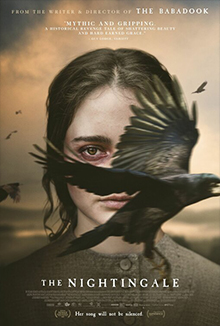
Director Jennifer Kent’s debut The Babadook was a huge success and this is her immediate follow up. The poster and some elements tease it as being another supernatural horror film but it isn’t really one even if some parts of it are horrifying to watch. It more resembles that genre of film that involves a wronged woman who subsequently attempts to enact vengeance against her aggressors. It does twist in a way that makes it more interesting but I’m not sure that it’s for the better.
Clare is an Irish convict who now works as a servant for the British Army in what is now Tasmania. Though she has finished serving her time and has been allowed to marry and now has a baby daughter, the unit’s commander Lieutenant Hawkins refuses to grant her the papers that would give her freedom. One evening after he has her sing for the soldiers during a visit by a superior officer, he rapes her. Her husband drunkenly confronts Hawkins about it the next day and Hawkins is further incensed when the officer denies him promotion due to his unit’s lack of disciplined. He decides to make the trip to town to appeal but along the way stops at Clare’s house where he and his underlings rape her again and then kills both her husband and her infant. Clare survives and is determined to follow the group to get revenge. But she is persuaded to take along an Aboriginal tracker, Billy, as a guide as she would never find the way on her own.
This type of scenario is familiar enough that the rape and revenge film is a genre all its own. One element that they often have in common is that the woman is cut off from anyone but her predators, as we have seen most recently in Revenge. Here however Clare is surrounded by people but is powerless to defend herself as Hawkins is only one part of an entire system of oppression that exercises near complete power over her as a convicted felon in penal colony. But then after we bear witness to the horrors that she is subjected to, we learn that the Aboriginals are even lower in terms of status and power than her on the totem pole. When Clare first meets Billy even as she is in the depths of her pain and grief, it is clear that she regards him as little more than a rabid animal and expects him to attack her the moment her back is turned. It’s a brilliant depiction of power dynamics and that while people like Hawkins are of course monsters, he wouldn’t be able to act as he does without the entire system enabling him. Similarly just because someone like Clare is a victim of the system doesn’t mean that she doesn’t use it to victimize others.
Kent who also wrote the screenplay herself makes interesting choices as well with how the revenge plays out. In most such instances, it’s always at least a little unrealistic how the victim instantly becomes a competent action hero. This isn’t the case here as for all of her rage and determination, Clare doesn’t magically turn into a fighter overnight. It does make it doubly frustrating for those searching for catharsis but then the film still goes back to a traditional ending after taking a different path. It’s great that Billy warms to Clare only after learning that she is Irish and not English but I feel that the film takes too meandering a path to reach a point we all expected anyway. In particular, I’m not sure what any of the Launceston scenes add to the film. Having Clare sing to me doesn’t seem to accomplish anything and it’s not like we need more proof of how evil Hawkins. It also leads to credibility problems with how the two seem to be able to get into and out of the town so easily. A shorter, tighter film that cut out all that would have been more emotionally effective in my opinion.
Overall this is a strong film but I’d mark it down for a weak ending. It is a mistake to focus so much on Hawkins and how terrible a person he is. What we really need to see more of is Clare and Billy bonding and learning of one another’s cultures and there’s not enough of that in here.